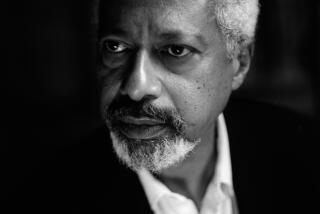Book review: ‘The Land at the End of the World’ by António Lobo Antunes
- Share via
Remember Angola? Let us rephrase the question: Have you heard of the Angolan war for independence, 1961-75, that brutal, pigheaded attempt by the Salazar dictatorship to hang on to Portugal’s prize African colony? If you draw a blank, don’t worry. Portugal’s most admired living writer, who was drafted as a young doctor into the conflict in 1971, compressed his two-year experience into a short, intimate novel that packs the impact of an exploding mortar shell. Read António Lobo Antunes’ “The Land at the End of the World,” and you, like the protagonist, may never forget the hallucinatory depravity, degradation and corruption of an unjust war that sent so many young men to Africa while stay-at-home elites reaped the profits.
In other words, it was a war like most wars: senseless orders, bad food and unimaginable atrocities.
The narrator’s confession, as poured out eight years later (along with plenty of whiskey) to a woman he’s trying to pick up in a Lisbon bar, opens with deceptively whimsical reminiscing about his privileged, if lonely, childhood. In the zoo nearby, the ostriches looked like “spinster gym teachers, waddling penguins like messenger boys with bunions, and cockatoos with their heads on one side like connoisseurs of paintings.” When it comes to simile and metaphor, Lobo Antunes is a shameless fountain of originality; comparison is his method, Hemingwayesque austerity be damned. Of the soldiers in camp he observes, “masturbation was our daily workout, we were pistons huddled in our icy sheets like aged fetuses no uterus would ever expel, while outside the pine trees and the fog met … the trees superimposing on the night the sticky dark of their trunks, sugared by the mist’s fairground cotton candy.”
Without the brilliant inventiveness of this prose (precisely translated by Margaret Jull Costa) that proliferates like jungle vines, it might be the rare reader who has the guts to go the whole harrowing distance with this guilt-ravaged field doctor. But the pleasure of reading is in the repeated shocks of the unpredictable, whether found in flashy arm-twists of plot or, far less often, in an entirely original turn of mind. Along with metaphor Lobo Antunes also excels in the aphoristic art of nailing a truth in one line. Happiness, as defined in Angola by the cynical doctor, was “that vague state resulting from an impossible convergence of … a good digestion and a smug egotism untouched by regrets.” But later, having brought the nameless, accommodating listener home to his echoing bare apartment — her “black bra draped over a chair like a bat waiting for darkness to come in order to leave its rafter in the attic” — he speaks to the ghost of his Angolan love, Sofia, and recalls a different, humbler happiness: the peace “found in the curve of a woman’s shoulder on which I could rest my despair and fear, in that tenderness devoid of sarcasm.”
Is “The Land at the End of the World” fiction or memoir? The key events and dates of the story appear to map seamlessly to the author’s biography. The narrator even sends up his younger self, a literary aspirant who dreamed of arriving in Stockholm “on board a boat of printed paper” and who “shamelessly plagiarized … the glassy glitter of the cheap metaphors I loved.”
But a writer can imagine multiple outcomes to his own life. The emotionally crippled, self-despising narrator of this novel is not the Lobo Antunes who would go on to write 18 more books and be compared variously (and confusingly) to Louis-Ferdinand Céline, Gabriel García Márquez, Proust, Faulkner, Conrad and Joyce. If one more name may be added it would be that of Tim O’Brien, author of “The Things They Carried.” At its mid-point, Lobo Antunes’ novel shifts into a seven-page rising crescendo, shedding all metaphor in four driving sentences, detailing the “wear and tear of war” with the empathy, rhythm and seething anger of O’Brien’s Vietnam march. From there, this novel carries the reader with it like a swollen river on the Angolan plain. There’s no turning back.
Maristed is the author of several novels, including “Broken Ground” and “Out After Dark.”
More to Read
Sign up for our Book Club newsletter
Get the latest news, events and more from the Los Angeles Times Book Club, and help us get L.A. reading and talking.
You may occasionally receive promotional content from the Los Angeles Times.










